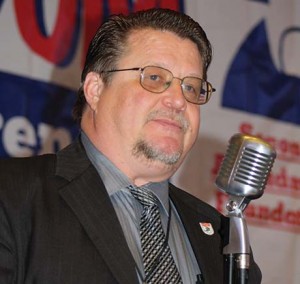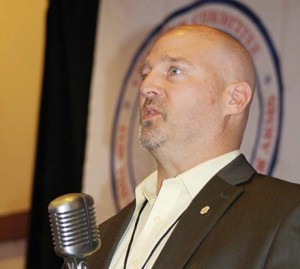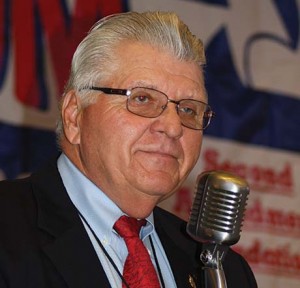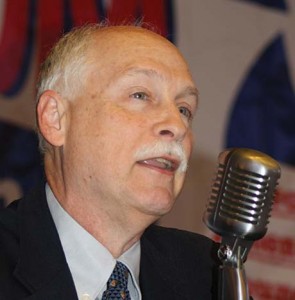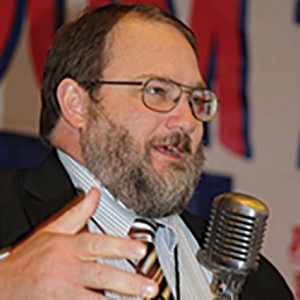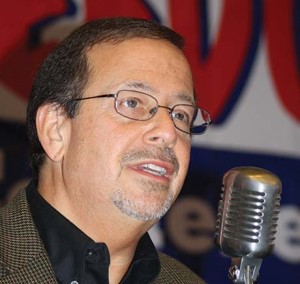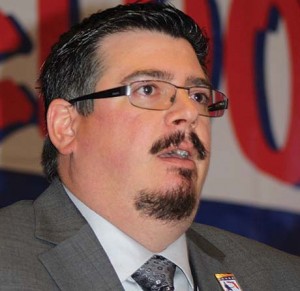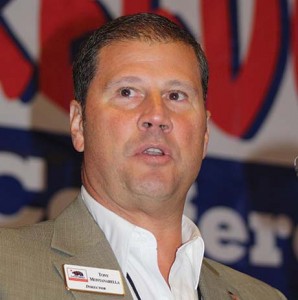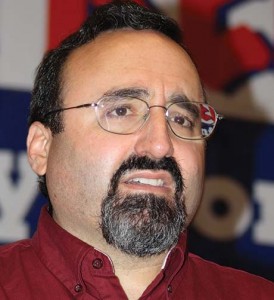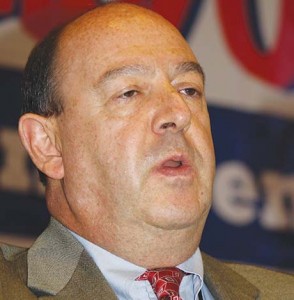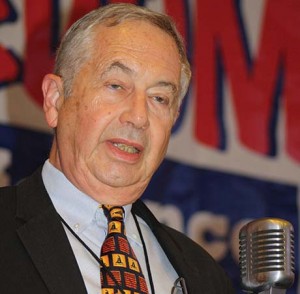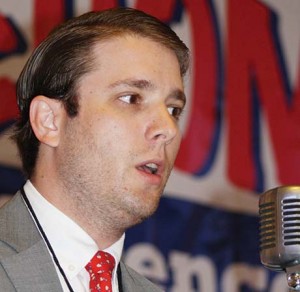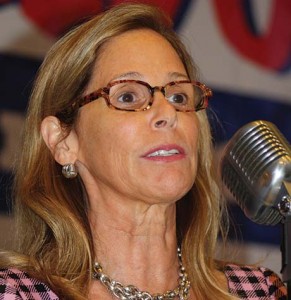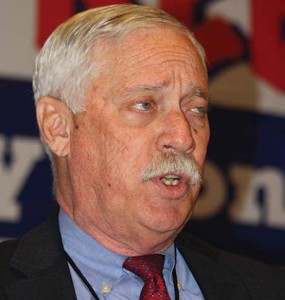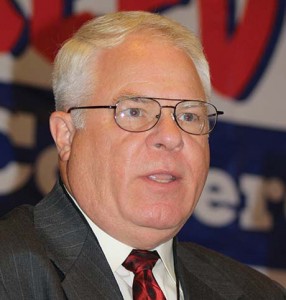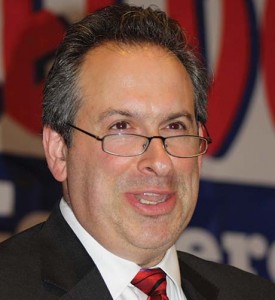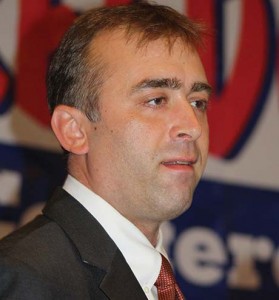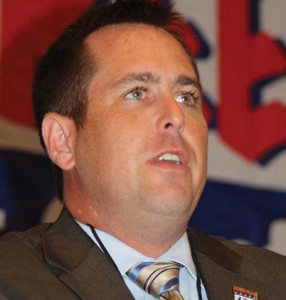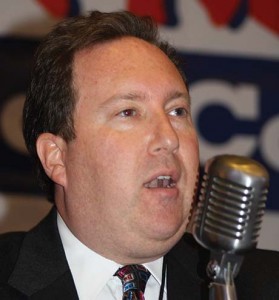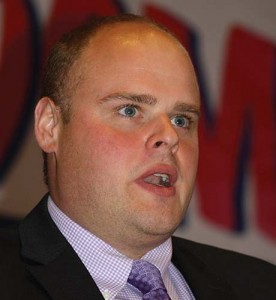by Dave Workman | Senior Editor
“Courts are not necessarily our friends when it comes to the Second Amendment.”
That was the observation from Stephen Aldstadt, president of New York’s Shooter’s Committee on Political Education (SCOPE). He was part of one of two state legislative affairs briefings at the 29TH Annual Gun Rights Policy Conference (GRPC), held in Chicago Sept. 26-28. The event drew hundreds of gun rights activists and advocates, Second Amendment attorneys and gun rights leaders from across the nation.
Despite the near disaster with air traffic control one day prior to the conference start, many people overcame the obstacles to get there and participate.
Aldstadt’s point was one that seemed to carry through the conference, which was largely focused on the outcome of the November elections. Those elections do matter, he intimated, along with several other speakers.
If the US Senate changes hands in January, then there will be an opportunity to prevent more liberal anti-gun judges from being appointed to lifetime positions on the federal bench.
Aldstadt comes from a state where gunowners have been severely and negatively impacted by the passage of the so-called SAFE Act. That sweeping gun control measure, pushed through by anti-gun Gov. Andrew Cuomo (D) in response to the 2012 Sandy Hook tragedy, has already ignited legal actions.
“Gun control,” Aldstadt insisted, “has to be stopped in New York State.”
Aldstadt’s presentation came on the opening morning of the conference. He was on a five-member panel that also featured representatives from firearms rights organizations in Ohio, Massachusetts, Virginia and Illinois.
Sean Maloney with the Buckeye Firearms Association, told the audience that there have been some significant gains for that state’s gunowners. There is no longer a duty to retreat from an attack, and hunters can now use rifles. Ohio school officials may now authorize school staff to be armed on campus, and now more than 300 teachers are reportedly allowed to carry firearms at school to respond to any attacks.
Richard Pearson, executive director of the Illinois State Rifle Association, reminded people that there are still many obstacles for Prairie State gunowners. On the other hand, people can make a difference, by boycotting businesses and even pulling their funds out of banks that are unfriendly to legally-armed customers.
“Armed patrons said they would stop using those banks,” he remarked, adding that in one day, one bank apparently lost some $3 million worth of accounts.
Pearson expects “at least 60” gun-related bills to be filed in Springfield during the next session, and that will mean more battles for firearms owners.
Philip Van Cleave, president of the Virginia Citizens Defense League, described the situation in his state as positive, with a pro-gun majority in the House, although anti-gun billionaire Michael Bloomberg has apparently been trying to exert his influence.
Van Cleave credited Congressman Eric Cantor’s loss in Virginia’s 7th District primary this year to his concentration on Washington, DC politics at the expense of his gunowner constituents.
In Massachusetts, Jim Wallace, executive director of the Gun Owners Action League, told the audience that, despite considerable push by anti-gunners following Sandy Hook, firearms owners were able to push back and prevent some onerous laws from getting through the legislature.
“As gunowners,” he recalled, “we knew what was coming.”
But instead of “curling up in their shells,” GOAL did 150 interviews with television, radio and newspapers and “got our message out there.” He said the media and general public were “not ready for how we handled this.”
“When you’re getting into these debates,” he advised, “change the tone. Make them look like fools because they don’t know what they’re talking about…Make sure you control the discussion.”
More state reports
A second panel on state affairs featured Scott Bach, chairman of the Association of New Jersey Rifle and Pistol Clubs; Paul Valone, president of Grass Roots North Carolina; Sean Caranna, co-executive director of Florida Carry.org; Tony Montanarella, board member and past president of the California Rifle & Pistol Association, and Andrew Rothman, vice president of the Minnesota Gun Owners Civil Rights Alliance.
Bach told the audience about the problems facing New Jersey gunowners, and cautioned that “A state can be an example or a warning.” In this case, the Garden State might serve as a warning to gunowners of what could happen in their states. Gun rights are under unrelenting attack, he explained, and if anyone wonders what anti-gun lawmakers are thinking, it is simply that they are not going to stop until they have disarmed the citizens.
The mantra appears to be “confiscate, confiscate, confiscate,” he warned.
Bach challenged his audience to “imagine if that happened to free speech.”
“It’s not about safety,” he said. “Only one gun law is needed. If you commit a violent crime with a firearm, we lock you up and throw away the key.”
Bach was followed by Caranna, who reported on the situation in Florida, where the state Sheriffs’ Association “fought us tooth and nail” over emergency evacuation legislation. He said the sheriffs were upset because the bill allowed people to evacuate their homes with firearms. The legislation was defeated, and Caranna said that could have some consequences for lawmakers in certain districts.
Caranna also pointed to one county where a school district’s hiring of 31 armed security guards to patrol campuses has been involved in a dispute with the local sheriff.
There has also been a change in the law that allows people to display firearms defensively without having to pull the trigger.
Montanarella limited his discussion to the “two or three most egregious things in California.” He noted that the legislature cannot blame any problems on Republicans, who are vastly outnumbered. The legislature is under hard Democrat control.
One lawmaker to allegedly run afoul of the law is Sen. Leland Yee, a devoted anti-gunner who earlier this year was indicted for various crimes involving alleged illegal gun trafficking.
He also discussed a restraining order bill that allows family members to report gunowners to police and then have them disarmed. This is in response to the Santa Barbara attack in the spring during which three people were stabbed and three more shot fatally.
Montanarella said there is a “culture war” raging across the country, and gunowners are all involved.
Rothman gave credit to the 2013 GRPC for helping gunowners win in Minnesota this year. He said the anti-gunners “thought they had us.” Proposals included semi-auto, magazine and ammunition bans, and all kinds of other schemes.
But gunowners “shocked them” by showing up en masse at the state capitol, with some 1,200 rights activists on the capitol steps. Minnesota gunowners took a lesson from Illinois activists, wearing the same color T-shirts to demonstrate. It put lawmakers into the position of not pushing legislation without consulting gunowners.
Rothman also took a moment to criticize Bloomberg’s lobbying group for flooding the state with mail supporting Sen. Al Franken, and he criticized one gun rights group for “turning on our friends in the legislature, who are seeing threats where none exist,” and for “taking credit for the work that real gunowners civil rights groups do.”
Valone introduced himself as a man whose hobby is “delivering pain to politicians.” He quickly ran down a list of his group’s accomplishments over the past couple of years, including a repeal of the state’s unconstitutional state-of-emergency gun ban. The group also pushed through an appeal of a Jim Crow era gun registration law that was designed to allow sheriffs to prevent minorities from getting firearms. The next move is to get Durham County’s gun registration list erased.
The North Carolina group has also confronted Gabby Giffords’ gun control group and Bloomberg’s Moms Demand Action activists.
The problem in North Carolina, he said, is the successes gunowners have achieved. This has led some people to believe that the fight is over. Valone encouraged the audience to tell their friends that the election is crucial, and the wrong result could set back gun rights at least 20 years. They have produced a “Remember in November” voting guide for gunowners.
Federal Affairs
The conference opened with a discussion of federal affairs. Chris Knox, director of the Firearms Coalition and founder of GunVoter.org, said the most important thing that the past year has demonstrated is that “We have shown the gun control lobby that the stove is still hot.”
He said the November mid-term elections are critical to preventing more anti-gun appointments to the federal bench, which means taking control of the US Senate with pro-gun votes. He also advised the audience that the way to keep gun prohibitionists on the defensive is to fight fire with fire.
“If we make the other side react to us,” he said, “then we’re going to be in good shape.”
Larry Pratt, executive director of Gun Owners of America, discussed the mindset of anti-gunners, and how the gun prohibition camp is constantly alarmed about private gun ownership. He related a story about how one anti-gun member of Congress considered it somehow threatening for Pratt’s group to suggest that the Second Amendment is “about insuring that you and I have our own private firearms if the government should head off in a tyrannical direction.”
“That’s what the Second Amendment is all about,” he said. “It’s keeping them on edge.”
Pratt also lauded the fact that a growing number of county sheriffs around the country have increasingly exercised their constitutional authority. In some cases, those elected lawmen have prevented federal law enforcement efforts from running roughshod, he suggested.
Seth Waugh, director of Government Relations for the National Shooting Sports Foundation, warned that there will be continued efforts by anti-gun and anti-hunting groups to ban lead ammunition for hunting, and then on gun ranges.
He said many of these people have “embedded themselves into state wildlife agencies,” essentially putting them in positions where they can push their own agenda.
Waugh stressed the importance of putting limits on the Environmental Protection Agency, especially where it involves regulating ammunition.
He also discussed the elections and how the Senate has been in gridlock. He said a pro-gun Senate would not seat an anti-gun Supreme Court justice, and with two years remaining in the Obama administration, there is a possibility that a vacancy could open up on the high court.
‘Collision course’
The Second Amendment is on a “collision course” with the international gun control movement, according to members of the panel that discussed international gun control efforts.
Julianne Versnel, SAF director of operations, warned that the international gun grabbers are well-financed and “extraordinarily well-organized.”
“They actually have more money than I think they know what to do with.”
Allen Youngman, executive director of the Defense Small Arms Advisory Council (DSAAC), followed with a discussion about the international Small Arms Trade Treaty, signed last year by Secretary of State John Kerry. It is not likely to be ratified by the US Senate, Youngman suggested, because ratification requires 67 signatures and last year, 68 members of the Senate on both sides of the aisle sent a letter to the White House explaining that the treaty is essentially dead on arrival.
He noted that a different treaty signed 20 years ago by then-President Bill Clinton still has not been ratified.
Youngman did caution the audience that there is nothing in the body of the treaty that protects the Second Amendment for US citizens. He noted that there was some bad language that was not included, and that every time a discussion on gun control came up over the past eight years, SAF or the National Shooting Sports Foundation and/or the National Rifle Association “was here.”
He said the “only way we can lose this fight is to lose credibility.”
“We need to be careful,” he warned. “If all they hear from you is cut-and-paste talking points from a huckster like Dudley Brown…you can imagine how a United States senator is going to characterize communications from you.”
DSAAC President Mark Westrom said the United Nations is an “exasperating organization…a big government organization.” The UN wants to “fix the world.”
He said the world organization has been “interested in disarmament for generations and they’ve had some victories and now they’re looking at small arms” more than they have done in the past. Several smaller organizations that have been interested in international gun control have actually made it possible by creating a set of International Small Arms Control Standards (ISACS).
One effort Westrom discussed was a document dealing with national controls over access by civilians to small arms, written by a man he described as a devout anti-gunner.
He recommended that everyone pay attention and become better informed and write better.
Legal challenges
A panel of six attorneys next took the stage to explain the latest legal activities on behalf of the Second Amendment.
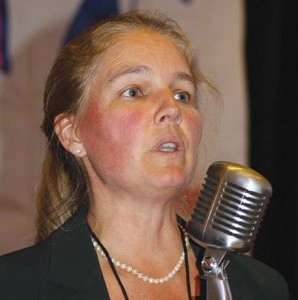
Paloma Capanna, litigator and policy analyst for the Second Amendment Coalition Resource Center in New York.
, reminded the audience that “we have the right to assemble, we have the right to free speech and we do have the right to keep and bear arms.”
She said that “this is probably the most critical moment that the Second Amendment has faced since 1791.” She called the 1994 “assault weapons ban” a “piece of legal fiction.” She discussed three cases that are “barreling like a freight train going uphill” against the gun laws in New York, Maryland and Connecticut.
One of these three cases could potentially reach the Supreme Court in two years, she suggested. Any of these cases could open the door to a ruling that might not be good for gun rights. It could lead to gun control from the bench, she intimated.
“We need to learn a couple of new tricks,” she said, noting that “The amicus brief is one of the more powerful tools that we are under-utilizing.”
She quipped that “you know things are bad in New York when people start talking about moving to California.”
Dave Schmutter, attorney for the Association of New Jersey Rifle & Pistol Clubs, reported on a ruling that a part-time resident of New York has a right to possess a handgun in the house. He practices law in both New York and New Jersey, and he is also involved in the case of Knife Rights v. Vance, against the “unconstitutional” law that has allowed people to be arrested for possessing a pocket knife that can be opened with a flick of the wrist.
The problem with this law is that different people can open knives with different amounts of dexterity. People are being charged with unlawfulpossession of so-called “gravity knives.”
“It’s impossible to know whether you’ve got a legal knife under this practice,” he said.
Meanwhile, in New Jersey, there was some good news. Shaneen Allen, the single mother of two charged with violating that state’s gun laws by having her licensed handgun in the state. She is a Pennsylvania resident with that state’s permit. She has been allowed to enter a pre-trial program that will spare her from criminal prosecution.
Attorney David Jensen, who has represented SAF in several cases, noted that guns are a political issue. He warned the audience that when an attorney is arguing a case, there is “a good chance you are presenting an argument to someone who disagrees with you philosophically.”
Because judges are appointed by politicians, they will likely be someone who agrees with that politician’s outlook on issues. Because of that, the outcome of court cases becomes “a little unpredictable.”
He said attorneys now involved in gun rights cases are “litigating not for right now but for the next 100 years.”
Next up was Eric Friday, an attorney for the Florida Carry and SAF in a case in the Sunshine State. He discussed a case involving preemption and explained that the legislature passed a law that put some teeth in the preemption law. Immediately after the law took effect, a case came up involving a college student who shot an attacker at a campus parking lot.
The school threatened to expel him despite the law, and school authorities backed off the attempt and settled.
Friday discussed a case involving open carry of a firearm. Oral arguments in the appeal of a case involving the state’s prohibition on open carry were to be held Nov. 6.
Illinois attorney David Sigale, who has also represented SAF, did a roundup of those cases, and the current situation in Chicago, where court rulings will require the city to allow firing ranges. He called the regulations “onerous,” and the case is continuing. About 20 challenges that SAF has been making have been whittled down, he said.
However, zoning and other restrictions essentially will keep the case going. He also reported on how the concealed carry permit application process with secret review panels is being altered, allowing people to find out why they have been rejected.
“This is all still in flux,” he said. “It’s obviously an unfair process.”
SAF General Counsel Miko Tempski wrapped up the discussion with a report on SAF legal activities, including the Palmer case in the District of Columbia that struck down the city’s ban on carrying firearms. He is confident that SAF will win that case, and he noted that in rulings he has
read, the courts have been citing back to earlier SAF cases, affirming the notion that the organization is winning firearms freedom one lawsuit at a time.
He alluded to Illinois carry law, which was forced by a case brought by SAF, and he said there were “probably a dozen people” in the audience who were carrying concealed.
Tempski said SAF finds the “right cases because we rely on each and every one of you” to help identify good cases and bring them to SAF’s attention.
Second Amendment allies
Rick Patterson, vice president of the Sporting Arms & Ammunition Manufacturers Institute (SAAMI), offered a glimpse of what that industry group does. He noted that SAAMI was instrumental in getting the UN to change shipping regulations and adopt a regulation that prevents the imposition of hazardous material fees on shipments of ammunition.
He also reported that SAAMI has helped rewrite Canadian firearm regulations.
Patterson, who received a Defender of Liberty award during the GRPC awards luncheon, noted that SAAMI does a lot of things quietly. The group, created in 1926 to set industry standards on ammunition and firearms, has earned a reputation for providing technical resources and factual information for government agencies and even the UN.
As firearms and ammunition regulations are being standardized, SAAMI is leading the way, which, according to Patterson, “means about $300 million per year that you don’t have to pay” as consumers.
However, he cautioned that anti-gunners and anti-hunters are focusing on lead, confusing the type of water-soluble lead compounds, such as are found in paint, with the elemental metallic lead.
“Those are two different entities,” Patterson explained, but that doesn’t make any difference to the anti-gun extremists who “can count on decades of people being told lead is bad” to bring about restrictions, or outright bans on lead ammunition.
At the same time gun prohibitionists are pushing against lead, they are also busy campaigning against alternative bullet materials, arguing, for example, that monolithic copper projectiles will pierce bullet-proof vests. There is a meeting on the conservation of migratory species in November in Quito, Equador, and one of the proposals is to phase out lead ammunition in three years, he disclosed.
Bloomberg, Holder, Mid-terms
On the second day of the conference, John Fund, national affairs correspondent for National Review Online, offered a highlight of the gathering by discussing the activities of Bloomberg, Attorney General Eric Holder and the prospects in the mid-term elections.
Holder’s announced departure several weeks ago suggests to Fund that Democrats believed they would lose Congress, and they needed to expedite a replacement while they still held a majority. In his final days as the attorney general, Holder had the largest gap between his positive and negative ratings, Fund noted, of anyone in the country.
He cautioned the audience that President Obama will simply appoint someone like Holder.
Fund was also critical of the mainstream press for its lack of coverage about the number of times the Supreme Court has ruled unanimously against Holder on “key constitutional issues.” He said the Obama administration has only been successful in about 37 percent of its cases.
He said unanimous rulings, to which liberal Obama appointees Elena Kagan and Sonia Sotomayor have joined, suggest the administration has taken extreme positions on constitutional issues.
He said the court of public opinion is shifting, with the media paying more attention to Obama administration outrages.
The audience really warmed up to Fund’s discussion of Operation Fast & Furious. He noted that Holder is the first attorney general to be held in contempt of Congress, and during that vote, one in ten Democrats voted for the sanction. The sanction came because Holder refused to turn over subpoenaed documents to the House Oversight Committee.
Fund predicted that the Fast & Furious documents now being sought by the House Committee on Oversight and Government Reform “will not be pretty.”
“Eric Holder has been the worst attorney general in the history of the United States,” Fund asserted.
More next month: We’ll wrap up our coverage of the 2014 Gun Rights Policy Conference with reports on dealing with the media, how to work with talk radio, public health policy, gun-free zones and more. All photos in GRPC story by Dave Workman.

